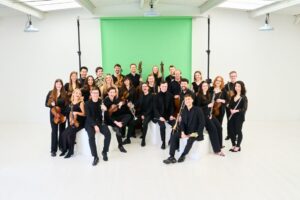Fantasia orchestra, Tom Fetherstonehaugh, Jess Gilliam, St Gabriel’s Church, Pimlico.
Fantasia Orchestra oozes youthful freshness. Conductor, Tom Fetherstonehaugh is still in his early twenties as are many of the fourteen players. And the upper strings play standing up which somehow frees up the sound and makes everything move more fluidly.
In the rather beautiful Victorian grandiosity of St Gabriel’s church we began with Anna Clyne’s Stride which is a respectful but imaginative response to Beethoven’s Pathetique sonata with some rich harmonies and suspensions. The acoustic in the building allowed us to hear every part and line especially in the the mysterious rising scales in the final section.
Jess Gillam is, of course, very good value in every sense. On this concert she played three works. First came the pretty familiar On the Nature of Daylight by Max Richter. Gilliam, who seems to draw pictures in the air with her soprano saxophone and plays with her whole body, drew out all the exquisite lyricism it needs. Well done to the orchestra too because it’s a difficult, very slow orchestral line to hold down especially when the switch comes and the strings get the melody while the sax plays the continuo.
Dave Heath’s The Celtic, a concerto for soprano in three movements, was new to me. Gillam and Fetherstonehaugh gave us a fast, virtuosic opening movement with lots of eye contact, a tender anguished duet with viola in the second and a well pointed rapport with the orchestra in the final jazzy movement. Gillam’s timing is pretty remarkable and she presents as someone who us every inch an unfussy team player – in her glittery trousers, boots and big glasses. I was sitting immediately behind the composer and overheard him say enthusiastically “ Every time I hearJess play it, it’s even better than the time before”.
After the interval, still in Scotland we got James Macmillan’s Saxophone Concerto which is always fun. I liked the way Fetherstonhaugh let the cross rhythms, col legno and pizzicato sing out in the first movement and delivered the Haydnesque joke ending with a musical grin. Gillam led the contasting psalm-based middle movement with gentle warmth and the energetic finale bounced along. What a strange (versatile?) instrument the soprano sax is, though: it can sound almost painfully beautiful whereas at others it quacks like a duck or sounds like a car horn.
The concert ended with two stalwarts of the string orchestra repertoire: Samuel Barber’s Adagio for Strings and – the only work in the concert which wasn’t written in the 20th century – Tchaikovsky’s Serenade for Strings. The Barber requires a controlled mixture of passion and concentrated intensity – and got it. And the Tchaikovsky was played with sunny panache especially the Valse which pounded along as if we were in a tea salon. Fetherstonehaugh is very good at balance, making sure every note in every section comes through within the texture. Leader, Sam Staples, is clearly a charismatic communicator too and I’m lost in admiration for his courage and confidence in reading his music from an iPad and turning his “pages” with a foot pedal – I’d be terrified the technology would fail!
